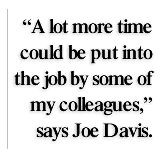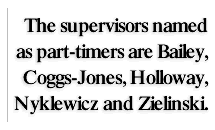Which County Board Members Only Work Part-Time?
It was 9 a.m. on a Friday morning in late October of last year when I began calling county supervisors for a story in Milwaukee Magazine. I called 15 board members and left messages, since not one board member was in the office. By the end of the day, less than half had called back.
 One ex-supervisor I interviewed later laughed about this non-responsiveness. “Well, they had a finance meeting Thursday and there’s a full board meeting Monday, so I guess they’re resting up,” he said.
One ex-supervisor I interviewed later laughed about this non-responsiveness. “Well, they had a finance meeting Thursday and there’s a full board meeting Monday, so I guess they’re resting up,” he said.
Times have changed since then, and supervisors are suddenly taking their jobs very seriously. But there seems little doubt that a portion of the board has been working part-time for what most would consider a full-time salary. Supervisors earn $52,227 annually, and had passed an ordinance (since rescinded) that would have gradually upped them to $67,000 by 2008.
“I would say a lot more time could be put into the job by some of my colleagues,” says Supervisor Joe Davis.
“I wish there were more supervisors in the office because that’s how legislation gets done,” says Supervisor Jim McGuigan. “I’d say half the board is in the office pretty often.”
Until the pension scandal exploded, most citizens probably didn’t know who their county supervisor was. When he went door-to-door, Supervisor Robert Krug notes, “I’d get people asking, ‘So what does that Milwaukee County do, young man?’”
The low level of knowledge about county government kept the work load low for supervisors. “A good part of the job is responding to constituent calls,” says Ald. Terrance Herron, a former county supervisor. “At the county, in an average week, I might have gotten five constituent calls. Now I get maybe 50, 60 calls a week.”
 The calls have gone way up since the pension scandal exploded, but there are still board members who do their best to keep their work load low. Supervisor Tom Bailey, for instance, has a law practice and “commits two hours each to his two committee assignments a month,” says one board member. “He sat in at the Personnel Committee pontificating about the pension fiasco as long as the TV cameras were there. Once they left, he left.”
The calls have gone way up since the pension scandal exploded, but there are still board members who do their best to keep their work load low. Supervisor Tom Bailey, for instance, has a law practice and “commits two hours each to his two committee assignments a month,” says one board member. “He sat in at the Personnel Committee pontificating about the pension fiasco as long as the TV cameras were there. Once they left, he left.”
“Tom Bailey probably spends 20-30 percent of his time on county issues,” says Herron.
Off the record interviews with current and former board members, lobbyists and other county insiders suggested that four other supervisors are definitely part timers: Elizabeth Coggs-Jones, T. Anthony Zielinski, Lee Holloway and Richard Nyklewicz.
Coggs-Jones does some work for Girl Scouts, says one observer. “She reads Avon catalogs at board meetings,” says one insider.
Observer say that Holloway does real estate on the side, while Nyklewicz, a long-time veteran who used to be a full-timer, has had health problems and has been a part-timer for several years.
Zielinski has been working toward his law degree from Marquette University. He says he’s a part-time student and will get his degree in four years rather than the usual three. Before that he got a masters degree from Cardinal Stritch while working for the county. “He’s a part-time board member and full-time student,” says one lobbyist.
A dozen people named Bailey as a part-timer, while the other four were named by seven observers. Two other supervisors got five votes for working part-time: James White and Michael Mayo. County insiders say White does some work as a minister, and Mayo works in insurance.
Back in 1989, Ament conceded that the board could be cut back to 19 members and the work would still get done. But as Supervisor Roger Quindel notes, county government has shrunk significantly since then: “We’ve lost a lot of functions. I don’t think you can justify reducing the number of county employees you supervise by a third and still have the same number of supervisors.”
Herron says the board could be cut to 15 members; Quindel would opt for 13 supervisors.
Back in 1996, when a private sector study of county government was done, county treasurer Tom Meaux suggested the board could be cut in half, the county executive be eliminated, and county manager could be appointed by the board. Former supervisor Jim Ryan suggested a similar change: 12 board members with an elected board president. These are still very sound recommendations.
Short Takes
Jim Ryan has entered the race for county executive. He is a thoughtful observer of county government who also served as CEO of the Milwaukee Regional Medical Center and as the village president of Hales Corners. It will be interesting to see if he stands behind his recommendation of 1996, that the county executive should be eliminated. If county government is to be reformed, it would be helpful to elect someone who does not see this as a longtime position, but will oversee a comprehensive reform of the entire government.
Parting Shot: The county board rolled back a provision that would have given supervisors a salary of $67,000 by 2008. Supervisor Jim McGuigan, who voted against the original pay hike, has this to say about his colleagues: “We have people with little private sector experience who wouldn’t earn $50,000 in the private sector.”
This article was originally published by Milwaukee World.
If you think stories like this are important, become a member of Urban Milwaukee and help support real, independent journalism. Plus you get some cool added benefits.
Political Contributions Tracker
Displaying political contributions between people mentioned in this story. Learn more.
Murphy's Law
-
Top Health Care Exec Paid $25.7 Million
 Dec 16th, 2025 by Bruce Murphy
Dec 16th, 2025 by Bruce Murphy
-
Milwaukee Mayor’s Power in Decline?
 Dec 10th, 2025 by Bruce Murphy
Dec 10th, 2025 by Bruce Murphy
-
Total Cost of Foxconn Is Rising
 Dec 8th, 2025 by Bruce Murphy
Dec 8th, 2025 by Bruce Murphy




















